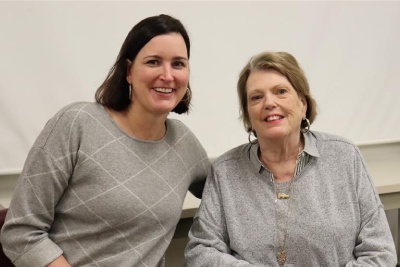
Kathleen Keeton – Lumbar Stenosis with Neurogenic Claudication
Published on Monday, April 12, 2021
Kathleen Keeton, a 79-year-old from Jackson, has a long history of back pain. She first underwent back surgery in 2012, followed by hip and knee replacement. Following the surgeries, she was able to resume most of her normal activities including walking with a cane for stability and driving. In late 2019, Dr. Chad Washington, Chair of the Department of Neurosurgery, treated her with steroids for lumbar stenosis, a narrowing of the spinal canal. She seemed fine until December, when she began having excruciating lower back pain and difficulty walking. She was bed bound and in agony.
Mechelle, her daughter who works at UMMC, decided to take her back to the hospital where she underwent a repeat MRI. It revealed worsening degenerative changes in her lower back resulting in severe stenosis with neurogenic claudication, or compression of the spinal nerves in the lower spine. “Dr. Washington could not believe how much her back had deteriorated within such a short time,” Mechelle said. “He thoroughly explained everything that was wrong with her back and how she would benefit from decompressive surgery and fusion. I appreciated Dr. Washington being so honest with our family the whole time. He explained that because of her age, this would be a very large surgery with a long recovery. He also said we shouldn’t expect her to continue driving.” Kathleen’s surgery was scheduled for December 30.
To stabilize Kathleen’s lower spine and reduce pain, Dr. Washington performed a posterior lumbar laminectomy, transforaminal lumbar interbody fusion (TLIF) at L3/4, L4/5 and L5/S1 and vertebroplasty at L3, L4, and L5. The complex surgery was successful, but long, lasting around eight hours. That night, Kathleen began experiencing post-operative seizures and was transferred to the ICU for recovery.
“Dr. Washington called us and told us that his team, along with neurologists and neuro-intensivists, could not figure out what was causing the seizures, but that we needed to trust him, and he would figure it out,” said Mechelle. “The next day, Dr. Washington let us know that he had stayed up all night reviewing her chart to see what she had been given throughout the day. He realized the seizures were caused from the intraoperative drug, tranexamic acid, for which there is only a 3% risk of postoperative seizures. The time and care he gave my mother were unbelievable. He saved her life.” Following surgery, the geriatric team saw Kathleen for medical management, and she was released to participate in physical rehabilitation.
After eight months of rehabilitation with Methodist Rehabilitation and home health, Kathleen was off her narcotic medications and able to drive and walk without a cane. She now lives independently and is back to her normal daily activities. “Dr. Washington looked me in the eyes and said, “I didn’t think you would ever walk, and you’ve exceeded my expectations,” said Kathleen. “You could see the pride and tears in Dr. Washington’s eyes when he watched my mother stand up and walk down the hall,” Mechelle said. “I truly feel like the outcome would have been completely different had we been at another hospital and did not have Dr. Washington, the residents, and the whole multi-disciplinary team. The collaborative care was phenomenal.”


